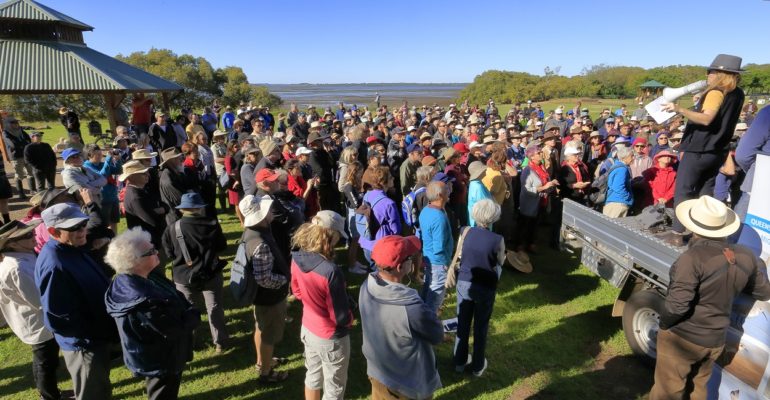
When Rio Tinto destroyed the Juukan Gorge in Western Australia in May 2020, it not only obliterated the profoundly significant 46,000 year old site described by archaeologists as home to the ‘dawning of humanity’, but also any trust or ‘social licence’ existing between Pilbara communities and the mining industry.
This devastating act did not result from ignorance, but greed. Experts had demonstrated the site’s significant historical value. There was loud and clear opposition from the Puutu Kunti Kurrama and Pinikura people.
Intervention was frantically sought, even as Rio Tinto prepared the site with explosives. But the company decided to sidestep these issues for the chance at more iron ore, with the support of the Western Australian government and under its cultural heritage legislation.
Now, the rich cultural history of the Juukan Gorge is gone forever, leaving a community experiencing “immeasurable cultural and spiritual loss and profound grief”.
The subsequent fall-out for Rio Tinto has been huge. Once considered a leader in corporate responsibility, the international outrage sparked by its greed and its failure to listen to community concerns has damaged the company’s share price and its global credibility. The CEO lost his job.
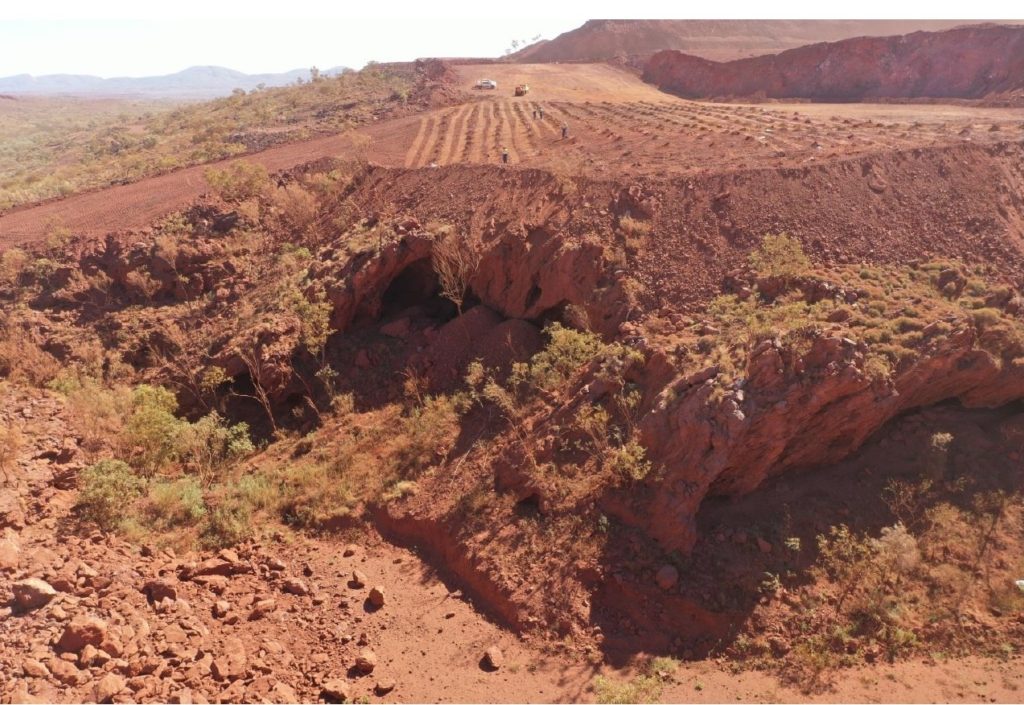
Never Again says a Federal parliamentary committee
The destruction of Juukan Gorge is being investigated by Federal Parliament’s Joint Standing Committee on Northern Australia.
A scathing assessment of Rio Tinto was included in the Committee’s interim report, titled Never Again, which was tabled in Parliament on 9 December.
“Rio Tinto’s conduct reflects a corporate culture which prioritised commercial gain over the kind of meaningful engagement with Traditional Owners that should form a critical part of their social licence to operate” says the Committee.
QYAC submission about Juukan Gorge
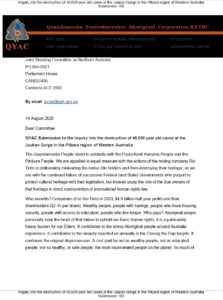
The Quandamooka Yoolooburrabee Aboriginal Corporation (QYAC) was one of many organisations that made a submission to the Juukan Gorge inquiry.
QYAC, which manages Traditional Owners’ interests in Quandamooka Country, said in its submission (number 106):
“We are appalled in equal measure with the actions of the mining company Rio Tinto in deliberately misleading the native title holders and then destroying their heritage, as we are with the continued failure of successive Federal (and State) Governments who purport to protect cultural heritage with their legislation, but instead usurp the role of the true owners of that heritage in direct contravention of international human rights law.”
Toondah Harbour

At Toondah Harbour, corporate greed and a complicit government are also marching together, towards profound habitat loss and community grief.
And let’s make no mistake here, if the proposed development goes ahead, like Rio Tinto and Juukan Gorge, Toondah Harbour risks an embarrassing loss of ‘social licence’.
A few people may get rich in the short-term, but the costs will be borne by broader industry, communities, the environment and future projects.
What is a social licence to operate?
Most of the time a community has faith that an industry, and the companies within an industry, will act responsibly and in a way that meets their expectations and standards. This unspoken acceptance is known as having a ‘social licence to operate’.
Social licence isn’t manufactured in public relations campaigns or with advertising spin. To create social licence, industry must build relationships with communities and other stakeholders by seeking their input and responding to their interests and expectations.
Responsible industries know that this has valuable long-term benefits, creating better, more innovative projects that are more likely to appeal to consumers.
They also know that losing social licence and damaging trust can create resistance, halting or delaying projects and costing time and money.
Good governance underpins social licence
For good reason, many industries are careful to protect their social licence and maintain community trust, including the construction industry. It’s a crucial aspect of responsible business. However, building community trust also requires democratic processes designed to negotiate and balance the needs of the community, industry and the environment.
Government frameworks are enacted to reflect the values and interests of the Australian people. Regulations set clear benchmarks and standards, government-funded scientific and economic organisations ensure that rigorous independent knowledge is available to make decisions, and engagement ensures that the community is included in the decision-making processes.
When government does not uphold these conditions, social licence can die on the vine. When this happens, industry loses credibility and certainty about their future projects, and communities become jaded and suspicious.
Toondah Harbour lacks social licence
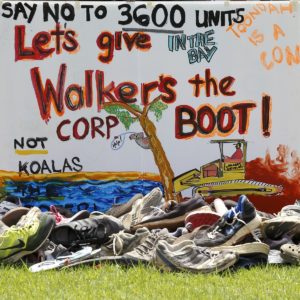
Like the events leading to the destruction of the Juukan Gorge, the history of Toondah Harbour is peppered with glaring signals that Walker Group and three levels of government (local, State and Federal) are failing to create a meaningful social licence for this project.
For a social licence for a project to be reached, the community must be able to have meaningful input into decision-making. This is no straightforward task. Not only are there various types of community that need to be engaged in development projects – including Traditional Owners, residents, affected interest groups, and potential users – they need to be provided with impartial, accurate and comprehensive information about the potential benefits and costs of a project, so they can make an informed decision.
Over the history of the Toondah Harbour PDA, communities have expressed ongoing concern and resistance to the development. Despite this, community input has either not been sought, has been dismissed, or has been conducted in an incomplete or biased manner.
For example, Redlands City Council’s community engagement in 2013 contains many questions which framed as ‘what Toondah needs’ or ‘what you would like to see at Toondah’. This shows a clear bias towards development, leading respondents to offer suggestions which are then reported as if this shows support for development.
Crucially, government consultation has been done with inadequate information regarding the true extent of the project, the actual economic benefits and risks to the community, or what environmental damage and impacts to wildlife the development will cause.
How can the community be considered to be consulted when they have not been fully informed?
Other danger signs point to a lack of transparency and consistency in decision-making. Maintaining environmental integrity is one of the clear expectations that many communities hold regarding development.
Yet together, Toondah Harbour developers and government have worked to shift the goalposts around environmental protection to favour the proposed development.
Deals are being done behind closed doors and the government has ignored the advice of its own experts that the development will have profound impacts on an internationally recognised wetland.
Towards a social licence
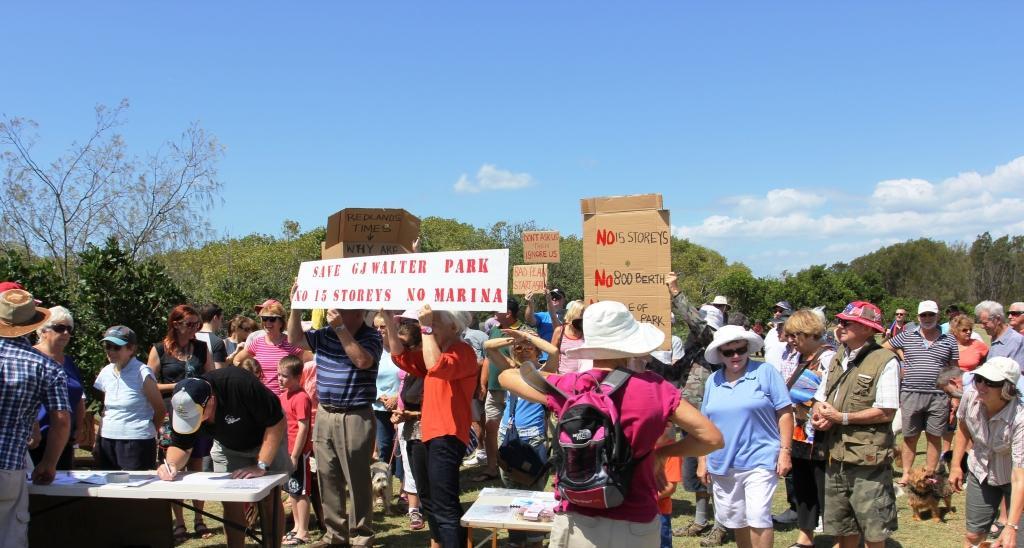
Unlike Juukan Gorge, there is still an opportunity to avoid community, environmental and social licence catastrophe at Toondah Harbour. In the meantime, we will continue to harness community momentum and engage industry towards creating a Toondah Harbour we can be proud of.
But if the Toondah Harbour development goes ahead as it currently stands, it not only risks community grief and unavoidable environmental damage, it risks loss of reputation and the erosion of the construction industry’s broader social licence.
The State Government must play its part to help build social licence, recognizing the voice of the community as expressed regularly in petitions to Parliament.
The Government must halt the current project as it stands, honour its own environmental standards and the international environmental agreements protecting the Moreton Bay wetlands, and work with affected communities to create a more sensitive, environmentally inclusive and innovative design for the Toondah Harbour site.
Redlands2030 – 13 December 2020
Redlands2030 gratefully acknowledges external expert assistance in writing this story.
Please note: Offensive or off-topic comments will be deleted. If offended by any published comment please email thereporter@redlands2030.net
One Comment
It is heart breaking what all levels of government are agreeing to. Any one can see the value of leaving this land alone. We as a nation have more animals, insects and marine life obliterated than any other country. Save our assets for the future.
RB